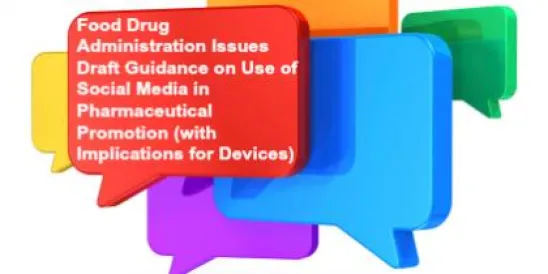he FDA recently issued a draft Guidance document addressing issues arising out of the use of various forms of social media in the promotion of pharmaceuticals. The draft Guidance is a welcome step given the uncertainty surrounding the issues, which has caused many pharmaceutical companies to shy away from social media. The draft Guidance still leaves many questions unanswered, however, and the FDA has stated that it plans to issue more Guidance documents in the future addressing other issues related to the use of social media.
As background, the FDA Safety and Innovation Act, passed in the summer of 2012, required FDA to “issue guidance that describes FDA policy regarding the promotion, using the Internet (including social media), of medical products that are regulated by the FDA.” RAPS’ Regulatory Focus Today reports that FDA deems this Guidance to satisfy that statutory requirement (despite its somewhat narrow focus).
The draft Guidance states that it addresses how “the applicant or [someone] acting on behalf of the applicant, of prescription human and animal drug and biological products (drugs) can fulfill regulatory requirements for postmarketing submissions of interactive promotional media for their FDA-approved products.” It defines “interactive promotional media” as including “modern tools and technologies that often allow for real-time communications and interactions (e.g., blogs, microblogs, social networking sites, online communities, and live podcasts).”
The draft Guidance is helpful in at least two respects. First, it states that in general firms are only responsible for content that they control, even if they financially sponsor a website. Although this draft Guidance is expressly limited to prescription drugs and biological products, logically the control principles should extend to medical devices as well.
Second, although the FDC Act requires drug firms to submit copies of promotional materials at the time of their initial dissemination, the draft Guidance states that the FDA will exercise enforcement discretion if the firms submit monthly updates of their promotional material in these types of interactive media. In other words, a firm does not have to send the FDA copies of tweets, Facebook posts, or blog posts every time it issues one. The draft Guidance also discusses how the updates should be provided.
The FDA has also stated that it plans to issue additional Guidance documents addressing other issues related to promotion via social media, such as the issues arising out of character space limitations, the proper use of links, and the obligation, if any, to correct misinformation posted by others. An example of a character space or link-related issue is how a drug firm can provide risk-related and warning information.
A copy of the draft Guidance can be found here.






 />i
/>i
